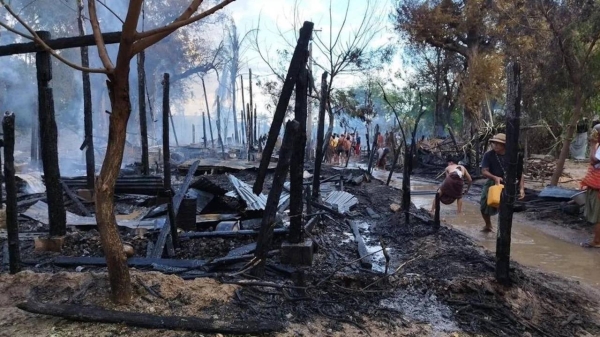
(Reuters) -Myanmar security forces opened fire on pro-democracy protests on Saturday killing at least five people, a protester and media said, as the military stepped up its bid to stifle dissent with arrest warrants for a further 20 high-profile critics.
Despite the killing of more than 550 people by the security forces since the Feb. 1 coup, protesters are coming out every day, often in small groups in small towns, to voice opposition to the overthrow of an elected government led by Aung San Suu Kyi and the return of military rule.
Security forces in the central town of Monywa, which has seen daily protests for weeks, fired on a crowd killing at least four people and wounding several, two media organisations said.
“They started firing non-stop with both stun grenades and live rounds,” the protester in Monywa, who declined to be identified, told Reuters via a messaging app.
“People backed off and quickly put up ... barriers but a bullet hit a person in front of me, in the head. He died on the spot.”
One man was shot and killed in the southern town of Thaton, the Bago Weekly Journal online news portal and residents reported. Police also opened fire in the central town of Bago, wounding one man.
Protests were also held in Myanmar’s second city, Mandalay, and the northern town of Hpakant, media reported.
Police and a spokesman for the junta did not answer telephone calls seeking comment.
The military has said those killed instigated violence. It says it staged the coup because a November election won by Suu Kyi’s party was rigged. The election commission has dismissed the assertion.
The Assistance Association for Political Prisoners activist group, in a statement earlier on Saturday, said the security forces had killed 550 people, 46 of them children, since the coup.
“People are still protesting every day because we believe strongly that this is a fight between good and evil,” protest leader Tayzar San said in an audio message to Reuters.
Slideshow ( 3 images )
State media announced that authorities had issued warrants for another 20 celebrities - including social media influencers, singers and models - under a law against inciting dissent in the armed forces, taking the number of warrants issued for high-profile democracy campaigners over the past day to 38.
The charge can carry a prison term of three years.
SILENCING THE VOICES?
One of the wanted, actress Paing Phyoe Thu, who attended rallies in the main city of Yangon in the weeks after the coup, said she would not be cowed.
“Whether a warrant has been issued or not, as long as I’m alive I’ll oppose the military dictatorship who are bullying and killing people. The revolution must prevail,” she said on Facebook. Her whereabouts were not immediately known.
Military teams were also searching for protest leaders and several “unscrupulous” people with homemade weapons had been arrested, state media said.
The military is also waging a campaign to control the flow of information, ordering internet providers to cut wireless broadband from Friday, depriving most customers of access, though some messages and pictures were still being posted and shared.
The United States and other Western countries have denounced the coup and called for the release of Suu Kyi, who won the Nobel Peace Prize in 1991 for her campaign against military rule. She has been charged with violating an official secrets act that is punishable by up to 14 years in prison.
The United States also condemned the internet shutdown.
“We hope this won’t silence the voices of the people,” a State Department spokeswoman, Jalina Porter, told a briefing.
The coup has rekindled old wars with autonomy-seeking ethnic minority forces in the north and the east.
Myanmar’s oldest insurgent group, the Karen National Union (KNU), has seen the first military air strikes on its forces in more than 20 years, after it announced its support for the pro-democracy movement.
The KNU, which signed a ceasefire with the government in 2012, said more than 12,000 villagers had fled their homes because of the air strikes. It called for an international embargo on arms sales to the military.
Media has reported that about 20 people were killed in air strikes in KNU territory in recent days, including nearly a dozen at a gold mine run by the group.
Fighting has also flared in the north between the army and ethnic Kachin insurgents. The turmoil has sent several thousand refugees fleeing into Thailand and India.












